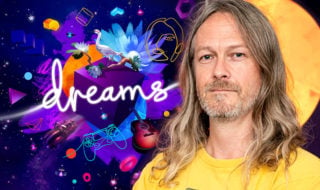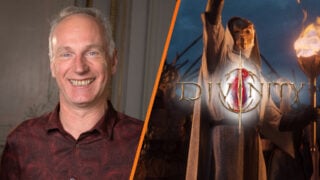Interview: Media Molecule’s grand ambitions for Dreams
Co-founder Mark Healey discusses plans for PS5, VR and more

Mark Healey hopes Dreams will generate the same wonder in players he first felt when he began making games on the Commodore 64 back in the 1980s.
The wildly ambitious game creation platform—designed to inspire a new generation of creators by “demystifying the digital arts”—finally released for PS4 this week having been in development at Media Molecule for most of the last decade.
Creative director and studio co-founder Healey told VGC he hopes to be able to support Dreams for many years to come. And if for some inexplicable reason it all goes wrong? Healey says the studio will simply use Dreams as the engine to make its next game.
In the full interview below, Healey discusses Media Molecule’s plans for Dreams, including VR support and letting users create multiplayer games, plus the studio’s role within Sony Interactive Entertainment Worldwide Studios.
In the past you’ve spoken about a desire to remain as small as possible in order to stay focused and ensure there’s no deadwood. Has that small team approach changed over the years and how many people does the studio now employ?
No, we’ve always tried to stay small and I’m probably completely wrong but I think we’re about 60 people including HR and office managers, so I’d say we’re still very nimble. Once you get above 30 people that’s when the communication problems start to kick in, I would say, but we’ve kept as small and agile as possible. I know some teams are like 300 or 400 people, so it’s a whole different ball game really. We probably thought we were going to stay at 10 people but that was just being naïve.

How long have you been working on Dreams?
I basically went on to it as soon as we finished LittleBigPlanet 2 whenever that was [December 2010], but just as a sort of R&D team if you like, so I’ve been working on this project for most of my 40s.
And are you anticipating supporting the game for a similar length of time as it took to develop?
Absolutely. As long as it gets some traction and Sony are behind us—which I think they certainly are—then absolutely. We treat it as a platform, this isn’t like we’ve made a game, ‘what are we going to do next?’ Releasing it is just one stop along the road really. We want to carry on supporting it. We’re currently working on VR, so we’re going to do a VR update with VR content.
What’s the timescale for that?
Just as soon as possible. I’ll probably get in trouble if I try and say a date, but literally as soon as possible.
And what about multiplayer support?
That’s probably the next thing after that I’d say. I mean, always take that with a pinch of salt, because we’ve got a community now and we’re trying to respond to them as much as possible, so sometimes they might have a bigger demand but they’re currently VR and multiplayer online, as in the ability to make multiplayer online games.
You’re releasing Dreams in the same year as PS5 and PlayStation boss Jim Ryan has stated he wants to transition PS4 players to the new console as quickly as possible. Would you like to have a version of Dreams playable on PS5?
Obviously at the moment we’re focused on PS4 and I would actually hope that it extends the life of the PS4 to be honest with you, then maybe when other companies start making games for it, the community will carry on making games for it, but if it’s as successful as we hope it is then it’s an obvious progression. You know, it’s a platform, so ideally in the future we’ll migrate to whatever is relevant. That’s probably about as much as I can say without getting smacked by someone.
Sony has said at the very least that it would like PS5 to be backwards compatible.
Well yeah, so I mean it works by default then, doesn’t it, that’s the thing. I mean, we want to support it going forward, so we want to be there for the full story really.

I definitely feel very lucky that we’ve been given that much rope to make something. You know I think the long-term hope is it will be as successful as something like that but it’s a very different thing to the examples that you gave. And if you look at things that are more similar like Minecraft or Roblox maybe or even things like YouTube, they take a while to ramp up so it’s a longer game, I think, in terms of our strategy but like I said earlier it’s a platform, we want to support it, so we’ve got the tools there, we’ve got the platform there now, so now the focus is going to be on creating and encouraging great content for it. This is just the start of things. We’re game makers, we’re not tool makers, so we’re going to make games with these tools now.
What do you think Sony’s expectations are for a Media Molecule game?
To be honest I think this is new territory for Sony as much as it is for us really, so maybe it’s a bit of an experiment. They know this is not a traditional game, but we had LittleBigPlanet under our belts, which is similar in a lot of ways. Dreams is very much the spiritual successor to that and that was very successful, so that’s a big part of what got us so much rope, I suppose. I’d love Dreams to surpass LittleBigPlanet. LittleBigPlanet in theory is something that you could make in Dreams.
With LittleBigPlanet you had Sackboy, who helped spawn a franchise with LBP for consoles, PSP and Vita, LittleBigPlanet Karting and an endless runner for mobiles. Does Dreams have the same franchise potential?
Yeah, it’s a different beast, it’s more towards the tools than it is towards the community thing. We’ve obviously tried to give it a strong branding, a strong visual identity if you like, but it is different because people can make their own visual styles in it, that’s the point of it really. We have the Imp thing, which is the closest that you could get to Sackboy, I suppose, and you can customise that, but this was very much more about trying to empower the community to put their own style in there, so I think it’s going to be more about the content that’s made rather than the thing itself if that makes sense.
“One of the things I think we should do is handpick some of the content that’s brilliant and go through the motions of taking it out as a standalone product and putting it on the PSN Store… I’ll make that happen”
But I would also say that there’s a unique philosophy to the tools as well, so we really tried to embrace this idea of performance and making it playful because ultimately, yes they’re tools and things, but it’s a console experience so it should be fun. People are going to use this sitting on a sofa, they’re not going to be sitting at a desk with a mouse and keyboard. So animation for example, you can animate in it, and you can do that in the way that professional animators want to animate with keyframes, timelines, curves and all this kind of stuff, or you can do it the Dreams way, which is just hit record and start moving stuff around, performing with it, even record your voice at the same time.
Anyone can pick up a puppet and put it on their hand and bring it to life, you can do that in Dreams, and that might not be the next big seller, but it makes my son laugh, and I don’t even have to publish what I’ve made, it’s just the fun of doing that, making a throwaway thing, so we’ve tried to apply that philosophy to all the tools, to make them playful, so that even if you don’t make something good, the process of making it can be fun, so I think that in itself is almost like an identity for it if you like.
You’ve previously described rewarding users for their creations as an obvious ambition. Do you have any update on whether users might be able to monetise their content or otherwise be rewarded for it?
We’re going through the motions at the moment of working out with Sony how we can do it. That’s about as much as I know about it really to be honest with you because it involves talking to lawyers and things. I have a tendency to fall asleep as soon as I start talking to lawyers but it’s no lesser an ambition.
One of the obvious things I think—this is a slight update if you like—one of the obvious things that I think we should do as a no-brainer is handpick some of the content that’s brilliant and go through the motions of taking it out as a standalone product and putting it on the PSN Store. It would make a fantastic story and seeing how the community has developed over such a short period of time, there’s already stuff in there that’s close to PSN worthy, I think, so that at the very least will happen I’m sure, I’ll make that happen.

But yeah, the ultimate aim is for people to be able to monetise their stuff somehow, but it’s a delicate balance. It’s not just about, how do you get things past the lawyers? It’s also about, what is it you want to get past the lawyers in the first place? What’s the model? It’s a tricky one because you don’t want to spoil that sense of people sharing and collaborating, you want to keep it friendly and money can easily make things turn a different way.
Especially when you see the quality that’s starting to come out of it as well, it’s just an obvious thing. I mean some people are already making money from it really, just from their YouTube channels showing, ‘look, watch me develop a game in 20 hours in time lapse.’ And like I say, it’s got that thing of actually being interesting to watch people make stuff, it’s quite entertaining to watch in a sort of Bob Ross type manner, you know?
Do you plan to release a mixture of free and premium DLC?
Yeah absolutely that’s something we plan to do.
What might we see on the premium side?
So the VR update, that’s just going to be an update for example, but if we were to spend longer, let’s say we were going to do something based on an IP, even one of our own IPs, we could do a LittleBigPlanet pack for example. If we did that, then if we were going to sell it, I think it would have to have, we’d want it to be worth some money and it would have to come with enough content to warrant buying it essentially, I think that’s the bottom line.
We have been releasing some free kits, so they’re like modular kits with assets we’ve made so that you can very easily kit bash something together. The stuff that we sell is mostly going to be things that are made in the tools, so in theory people could make those things themselves, but what you’re buying is the fact it’s made by people that are great artists and great musicians.
Given the studio’s stated ambition to democratise game creation, would you like the game to be available on more platforms, for example on PC?
I think that would be cool. I mean obviously Sony has an opinion about that but yeah, I don’t know where it’s going to go in the future, I mean it would be great to see that. That’s not something that’s happening right now but I think a lot of that depends on where the games industry goes in general, I suppose. I think Sony has become more open recently to publishing stuff on the PC in general anyway, haven’t they? Isn’t there some stuff that’s happening, I’m not sure?
Beyond bringing game development to the masses, what ambitions do you have in the world of video games or beyond?
Within my life I’ve got things that I’d like to do. To be honest with you I never plan that far ahead, I just tend to take it as it comes a little bit. I love music for example. I’ve got lots of ideas for things personally that I want to make within Dreams, stuff that publishers would never normally let me publish, but I’ve created a Trojan Horse now so I can get these things out there whether you like it or not, so certainly there’s some crazy things I’d like to do. I’m a massive Pink Floyd fan, for example, and I love concept albums, and I love the idea of making something that’s kind of equivalent to a concept album on a computer if that makes sense. I can’t really explain it, I’ll have to just make it one day.
“So I’ve got ambitions to make lots of silly things. I’m very tempted to make Rag Doll Kung Fu actually, Rag Doll Kung Fu 2”
That’s kind of what excites me about Dreams, is people can just make whatever they want really, and the fact that I can go and play these things that are made by other people, ordinary people that wouldn’t normally make it to a console. Some of it’s just silly, some of it’s hilarious and some of it’s pretty niche, but I would argue that’s a breeding ground for very fresh and original ideas and potentially that’s how you’d discover the next big blockbuster.
So I’ve got ambitions to make lots of silly things. I’m very tempted to make Rag Doll Kung Fu actually, Rag Doll Kung Fu 2, that was something that, just having time to actually do these things is the big factor. I’ve actually been developing a Commodore 64 version of LittleBigPlanet in my spare time, believe it or not, because I love making games. That’s obviously not driven by trying to make money. I don’t think there’s much of a market for Commodore 64 games any more but I just love doing it, I just love the feeling, it’s like a time machine, it’s like going back and being a child, so maybe I can persuade Sony to publish that one day.
Has Media Molecule been a one-game studio since the completion of Tearaway Unfolded in 2015, or have you had other projects on the go alongside Dreams?
Since Tearaway we’ve all been on Dreams. I mean it’s interesting because we’ve got Dreams now as this amazing tool, we use that internally and it means we can make stuff very quickly now, we can prototype an idea in a day, get something up and running and test it, so who knows, maybe we could split off and do [something]. We’ve been doing lots of little separate smaller things anyway, we’ve done a bunch of various collaborations with various partners, we did something with a theatre company, but I’d actually like us to come together and do a bit of a bigger piece of content to be honest with you.
So Dreams is Media Molecule’s new game development engine?
That’s what it is. If Dreams doesn’t succeed for whatever reason, then we’ll just use it to make our next game anyway because technically the stuff that’s made in Dreams can be pulled out and work as a standalone product anyway. I’ve worked in the games industry for a long time and a big part of making a big game, a big proportion of that is making tools for that game anyway, so really it’s not that much different, other than we’ve given the tools to the public and made them a bit more user friendly, because often those tools that you use internally are horrible.

While quality is more important than quantity, can you understand why there might be some disappointment from players about the scope of Art’s Dream, the 2-3-hour story mode? What was the thinking behind its length, and was it always planned like that or did it get scaled back at any point?
We had to strike a balance because we were making the tools and the game at the same time, and often we’d have to remake a lot of the game because this part of the tool was just not working, it should really be done like this, and because the game that we’ve made is a non-cheating, genuine example of using the tools, when we changed something we had to remake it using the tools.
But it was never planned to be a 10-hour epic or anything, it was always very much, this is a showcase, an example of what you can do with the tools and that’s why it sits amongst all the other content that the community has made, it’s not a separate part of the game.
So yes, you can play it through in two or three hours, but you’ve got a lifetime’s worth of content there potentially from the community. Even with Art’s Dream itself, when you play that, there’s lots of items that you can collect along the way which are modular pieces—the characters and the various sculptures and things—that we used to make Art’s Dream so it’s very quick for you to make a very similar looking level and in theory, the community will take a lot of those things and do their own D-Bug adventure. And we obviously plan to make more content ourselves.













